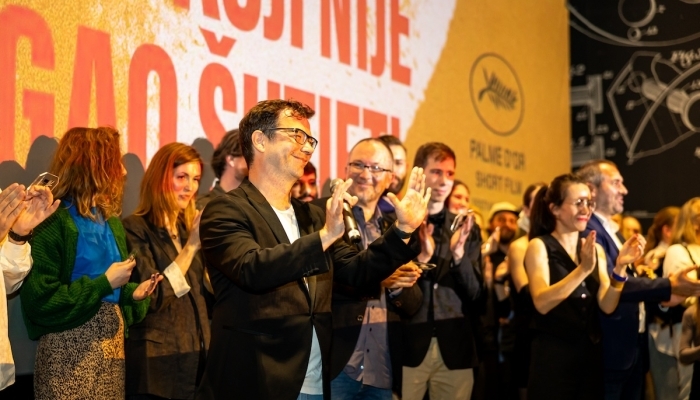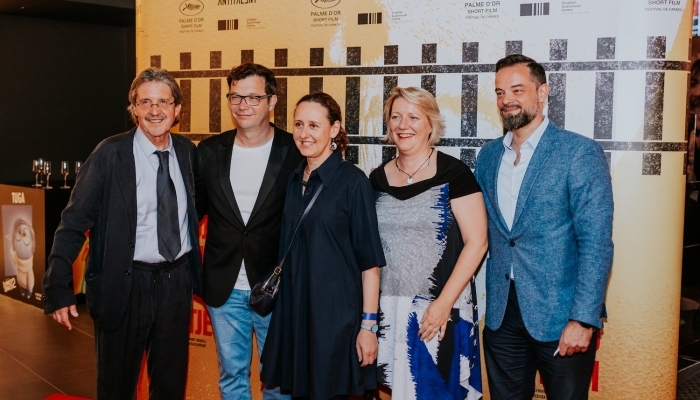Gala celebrating first Croatian Golden Palm for Nebojša Slijepčević’s The Man Who Could Not Remain Silent



The gala party on the occasion of the first Cannes Film Festival Palme d'Or awarded to Nebojša Slijepčević for his short fiction film The Man Who Could Not Remain Silent, was held on Sunday, 2nd June, at the Kaptol Boutique Cinema in Zagreb, organised by the Croatian Audiovisual Centre.
The celebration was attended by the film crew led by director and screenwriter Nebojša Slijepčević and producers Katarina Prpić and Danijel Pek, as well as more than five hundred guests, film professionals and public figures.
This important celebration for domestic filmmaking was supported by the representative of the Prime Minister, the Minister of Culture and Media, Nina Obuljen Koržinek, Head of the Prime Minister’s Office Zvonimir Frka Petešić, Mayor of Zagreb Tomislav Tomašević, Ministry of Culture and Media State Secretary Krešimir Partl, Members of Parliament Ivana Kekin, Damir Bakić, Milorad Pupovac, Head of the City Office for Culture and Civil Society Emina Višnić, and numerous other political and cultural officials.
“I would like to thank everyone for the great response to this celebration and I express the hope that we will continue to build our sector in the spirit of togetherness”, said the CEO of the Croatian Audiovisual Centre, Chris Marcich, in his opening speech. “The positive effects of this golden award are already happening on the international scene. Congratulations continue to pour in from all over Europe and beyond. Croatian filmmaking has been put on the global film map and it is up to us to take advantage of it”, added Marcich congratulating the entire film crew and thanking the film’s producers Katarina Prpić and Danijel Pek.
“This is a magnificent success, and our thanks highlights the value of teamwork and the vital role of the producer in the creation process. Antitalent was the driving force behind Antoneta Alamat Kusijanović’s feature Murina as well, which won the Golden Camera in Cannes in 2021. I hope that you will continue along this course”, added Marcich.
The Minister of Culture and Media and representative of the Prime Minister, Nina Obuljen Koržinek, congratulated the film crew on this memorable achievement. “You recognised an important story and told it in such a way that it caught everyone’s attention at the most prestigious film festival”, she pointed out. “We are probably not even aware of the magnitude of this accomplishment and the many opportunities it will open up, and together with HAVC, we will continue to create production and financial conditions so that you and your colleagues can continue to garner success”, said Obuljen Koržinek.
“I don’t make films to win awards at festivals, but for the audience, primarily Croatian audience to see, so this evening is more important to me than the Cannes premiere and all subsequent premieres in Croatia will be a real test for the film”, said Nebojša Slijepčević. “I am also grateful to all my predecessors who paved the way with their earlier successes; my film would not have received this much attention if it weren’t for their successes”, he added. “When all this glamour is stripped away, what remains is the recognition for the film, which is the best possible PR we could imagine, lending the film a wider audience across the world and allowing it to reach more people. We are not important, it’s the film that matters”, added Slijepčević.
The Man Who Could Not Remain Silent takes place on 27th February 1993, at a small train station in Štrpci, Bosnia and Herzegovina. A passenger train traveling from Belgrade in Serbia to Bar in Montenegro was stopped by armed Serbian paramilitary forces in a raid involving an act of ethnic cleansing. As they took nineteen civilians off the train, only one of the five hundred passengers dared to stand up to them. This is a true story about a man who could not remain silent.
“This is a way to correct one wrong, yet it is not only a film about historical events, but an allegory of today’s events too, which is something the Cannes jury has recognised. It apparently takes place in 1993 in Bosnia, but today’s viewers could just as easily imagine themselves in similar circumstances given the current events in the world, or in Croatia”, concluded Slijepčević.
At the end of the festivity, Darko Buzov, the son of the film’s main protagonist thanked the director for making a film honouring his father’s actions via a video message.
Based on real-life events, the script is penned by Nebojša Slijepčević, while the cast is headed up by Goran Bogdan, alongside Alexis Manenti, Dragan Mićanović, Silvio Mumelaš, Lara Nekić, Priska Ugrina, Dušan Gojić, Nebojša Pop Tasić, Mijo Pavelko, Martin Kuhar, Jakov Zovko and Robert Ugrina.
The Man Who Could Not Remain Silent is produced by the company Antitalent, with co-producers Katya Trichkova (Contrast Films, Bulgaria), Noëlle Lévénez (Les Films Norfolk, France), and Boštjan Virc (Studio Virc, Slovenia). The film was also supported by the Croatian Audiovisual Centre.
The short had its world premiere at the Cannes Film Festival, while the Croatian premiere is expected at the Mediterranean Film Festival Split, on 18th June, at the Bačvice Summer Cinema.
Photographs from the celebration are available at THIS link.
Cover photographs: Palme d'Or gala reception
(first, third and fourth photo courtesy of: Samir Cerić Kovačević; second photo by: Julien Duval)
